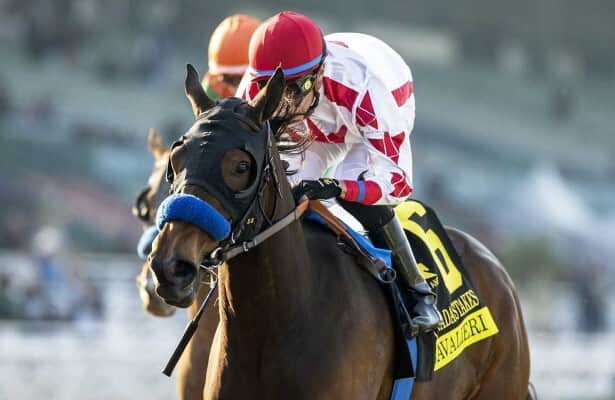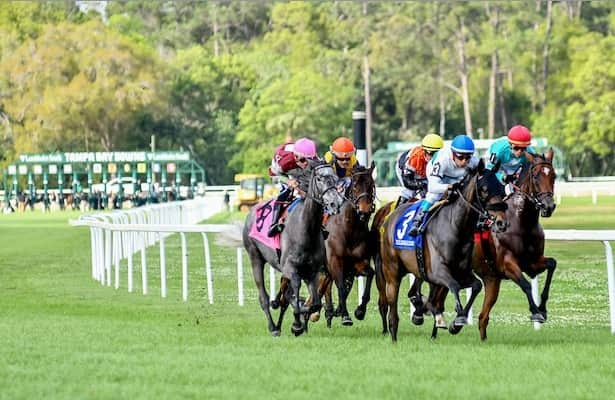Three Deaths During Horse Racing at Cheltenham Prompts Urgent Action From Authorities: “Being Sacrificed”

The Cheltenham Racecourse is in shock and mourning after a tragic turn of events. Last Sunday, during the prestigious November Meeting on November 17, three horses lost their lives in a single day of racing, leaving the horseracing community shrouded in grief and despair. The grim incidents, occurring just hours apart, overshadowed the day’s events and sparked renewed calls for stricter regulations in horse racing.
Abuffalosoldier, a seven-year-old horse, had just claimed victory in the Holland Cooper Handicap Chase when tragedy struck. Moments after crossing the finish line, the horse collapsed as jockey Sean Bowen was completing an interview with ITV Racing. Veterinary experts rushed to the scene in a desperate attempt to save the young soul. Sadly, despite their best efforts, the horse took his final breath.
Tragic deaths at Cheltenham reignite debate over horse racing safety
ADVERTISEMENT
Article continues below this ad
Earlier in the same race, Bangers And Cash collapsed after clearing the 14th fence. Shortly afterward, Napper Tandy was euthanized following a fall in the Greatwood Handicap Hurdle. The entire racecourse was left in a state of shock as news of these fatalities spread. This tragic sequence of events has sparked fierce reactions from animal welfare groups, who are now calling for immediate changes in the sport. The acting chief executive of the League Against Cruel Sports, Chris Luffingham spoke out strongly against the industry. He stated, “These shocking deaths show why a new independent regulatory body with horse welfare as its number one priority needs to be created.”
The deaths have reignited a long-standing debate on the safety of horse racing. Animal rights activists argue that the current regulations do not adequately protect the welfare of the horses, who are often pushed to their physical limits in pursuit of victory. Luffingham further added, “One death is too many – horses are being pushed beyond what they can safely achieve and are being sacrificed for people’s entertainment and gambling.”
As the sport continues to remain under scrutiny, many are questioning whether enough is being done to minimize risks and ensure the well-being of the innocent animals involved. In response, the British Horseracing Authority (BHA) has expressed its condolences and emphasized the efforts made by veterinary teams to provide the best possible care for the horses involved. One of the spokesperson added, “As with all fatalities, we will seek to understand the circumstances behind each incident as we strive to continue to reduce avoidable risk in our sport.”
The BHA also stated, “All three (horses) were provided with outstanding care and attention throughout their lives by those who cared for them and nobody will be more heartbroken tonight than those individuals.”. The events of Sunday’s race meeting have put the spotlight back on the issue of horse racing fatalities, with many now calling for more stringent safety measures to be put in place. Even more so because, beneath the thunder of hooves and the roar of a cheering crowd, racehorses endure extraordinary physical demands that push their bodies to the edge of human imagination.
How the silent threat of cardiovascular issues continues to put the lives of equines in danger
These majestic creatures, trained for speed and endurance, often carry the weight of not only their riders but also the hopes of their connections. And hidden within their impressive displays of prowess, there lies a vulnerability that even the most advanced training and veterinary care cannot always mitigate. It is cardiovascular failure. The recent tragic demises of the horses at the Cheltenham Racecourse serve as a stark reminder of the physical toll exacted on elite racehorses.

ADVERTISEMENT
Article continues below this ad
Sudden cardiovascular collapse, a condition that strikes without warning, is a phenomenon seen in animals during times of peak exertion. In horses, this can manifest as heart attacks or ruptured blood vessels, often with fatal outcomes due to the speed and intensity of racing. The sudden collapses of Abuffalosoldier and Bangers And Cash were likely the result of cardiovascular failure.
Veterinary experts have confirmed that such incidents are not as rare as they may seem. “In both cases, we call them cardiovascular collapse,” said Liam Kearns, chief vet at Cheltenham. The expert also added, “It’s a high-intensity racing situation. We have similar incidents when marathon runners experience sudden collapse due to the intense strain on their bodies.” Interestingly, similar risks exist in human endurance sports. Marathon runners, for example, occasionally experience cardiac events triggered by prolonged physical stress and undetected conditions.
ADVERTISEMENT
Article continues below this ad
The rapid buildup of lactic acid, dehydration, and increased blood pressure during competition can also cause the issue. Kearns noted, “…but if it is a true cardiovascular collapse, not a lot can be done.” As the racing world grapples with these risks, the tragic news of the demise of the three equines left one question looming in our minds. What can be done to truly secure the lives of the animals?
Related
Leading Parx jockey Sanchez will serve 7-day suspension
Photo: Jason Moran / Eclipse Sportswire Jockey Mychel Sanchez will serve a seven-day suspension and pay an additional $1,750 in fines
Bill Mott talks about plans for Sovereignty, Just F Y…
Photo: Gulfstream Park / Lauren King Sovereignty, dramatic late-running winner of the Fountain of Youth (G2) March 1, is being pointed
Up-and-coming Cavalieri chases Grade 1 glory in Beholder Mile
Photo: Santa Anita / Benoit Photo Cavalieri and Alpha Bella, who finished one-two in the Grade 3 La Cañada in January at Santa Anita,
4 stakes showcase shipping stars on Tampa Bay undercard
Photo: Gonzalo Anteliz Jr. / Eclipse Sportswire The stars will shine Saturday at Tampa Bay Downs, and not just in the Grade 3 Tampa Ba











